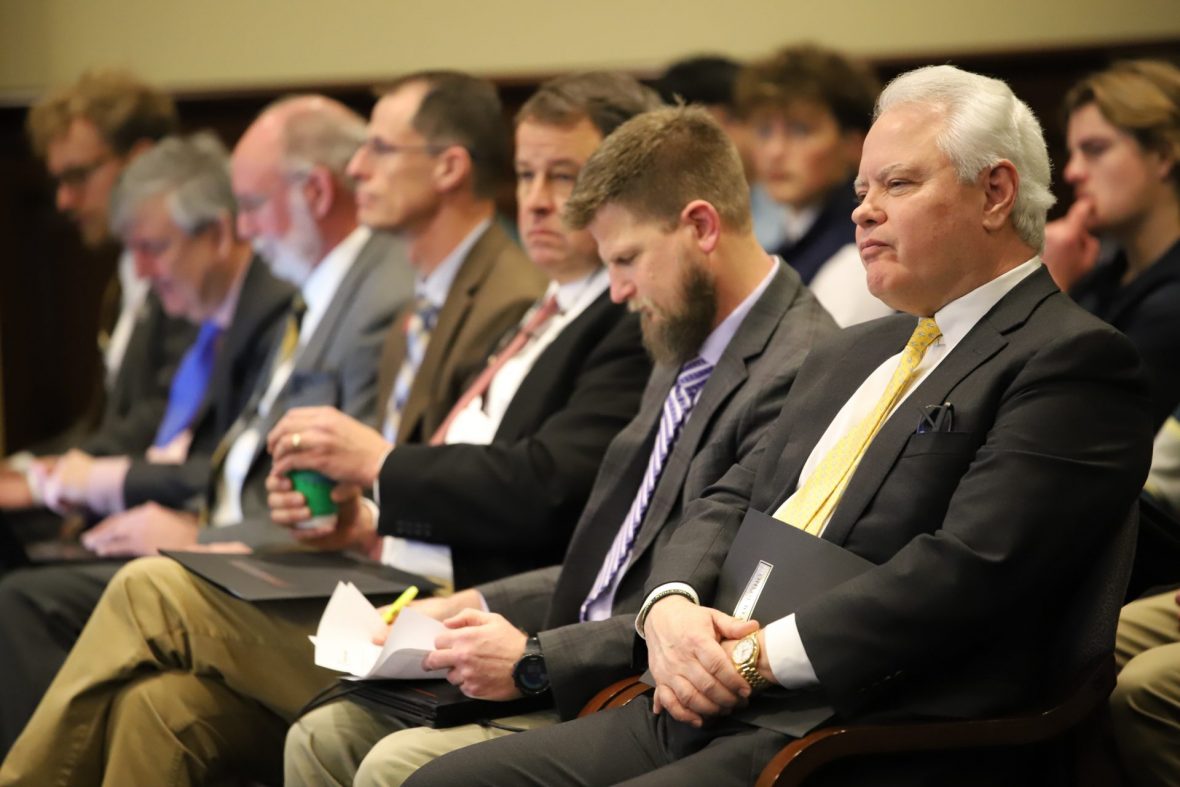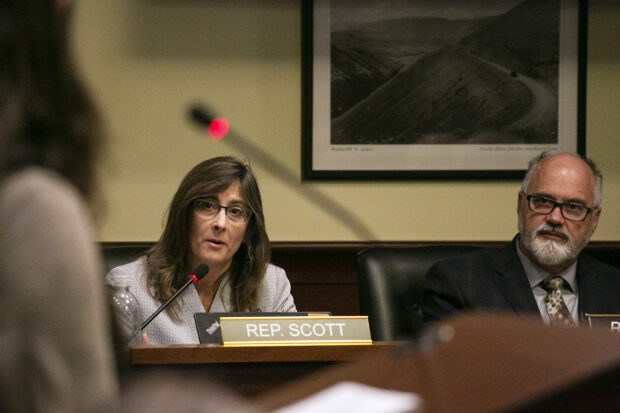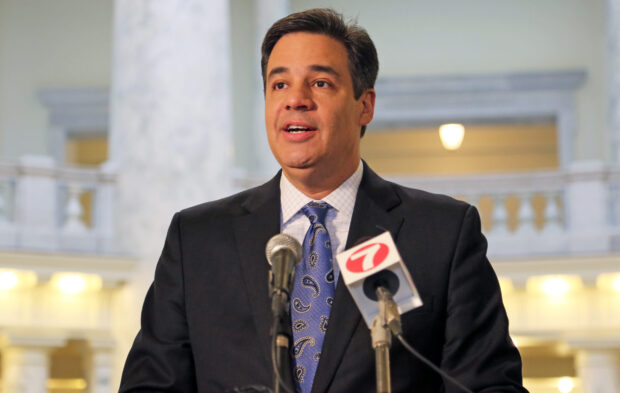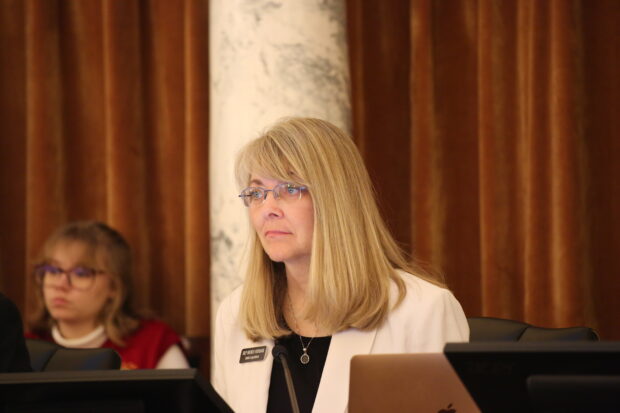
The University of Idaho has run up more than $3.9 million in University of Phoenix-related costs so far this year.
The biggest bills, $1.7 million, came from U of I President C. Scott Green’s previous employer, an international law firm hired to navigate federal laws and the acquisitions process.
The expenses continued to spiral during a rocky legislative session — when House and Senate votes stalled the controversial purchase.
And now, after a year and more than $14.2 million in expenses, the U of I’s $685 million bid to absorb the nation’s largest for-profit online university remains in jeopardy. Phoenix now has the go-ahead to explore other options, although its owners have agreed to pay fees that could cover most of all of the U of I’s upfront costs.
Recently released invoices — obtained by Idaho Education News, through a public records request — shed new light on how much the U of I has spent in its pursuit of Phoenix, and who has profited. But the heavily blacked-out documents leave many details under wraps.
The big players
The University of Idaho has spent more than $14.2 million pursuing the University of Phoenix — with almost all of the money going to nine law firms and consultants.
Here is the rundown, based on invoices from May 2023 through June 2024:
Hogan Lovells. An international law firm, hailed by the U of I as an “industry leader.” Hogan Lovells has counseled the U of I on federal education law, income tax law and the process of mergers and acquisitions. Total invoices: $9,214,459.42, including $1,697,002.69 this year.
Ernst and Young. An international accounting firm, based in Secaucus, N.J. The U of I says it brought in Ernst and Young to work on financial due diligence, “including quality of earnings analysis and … accounting elements of the transaction.” Total invoices: $1,337,400, including $342,900 this year.
Rieth Jones Advisors. Based in Columbus, Ohio, with one of its satellite offices in Sun Valley, Rieth Jones was brought in to look at closing conditions and mitigate purchase risks. Total invoices: $893,870.10, including $179,400 this year.
Hawley Troxell. A Boise-based law firm, which has asserted that the State Board of Education can create a nonprofit to manage Phoenix on the U of I’s behalf. Total invoices: $762,066.87, including $569,662.07 this year.
PFM. A Philadelphia-based firm that has advised the U of I on past bond issues. Total invoices: $670,000, including $90,000 this year.
Gjourding Fouser. A Boise law firm that has defended the State Board in an ongoing lawsuit over its closed-door discussions of the Phoenix purchase. Invoices to the U of I: $479,744.98, all this year.
Nixon Peabody. An international law firm that will work as the U of I’s “bond counsel.” The firm’s job is to determine whether the bonds for the Phoenix purchase would be tax-exempt. Total invoices: $370,000, all this year.
Vantage Technology Consulting Group. Engineering consultants, based in El Segundo, Calif. Total invoices: $190,584.45, including $27,636 this year.
McClintock and Associates. A Bridgeville, Pa., consulting firm that works on higher-education acquisitions and federal student-aid issues. Total invoices: $104,500, all in 2023.
What we requested, and received
In June, EdNews requested all Phoenix-related invoices, submitted to and paid by the U of I since Dec. 23. (Earlier this year, EdNews requested and reported on invoices submitted up to Dec. 23.)
Last week, the U of I released 610 pages of invoices, after charging EdNews to identify, review and redact the documents.
Despite the editing, which blacked out some documents almost in their entirety, the bills illustrate the extent and the expense of the U of I-Phoenix courtship.

The invoices include big bills from consultants and law firms, and smaller bills around the periphery of the process.
- Ernst and Young, an international accounting giant, billed the U of I an additional $342,900 in February and March, largely for what one invoice termed “financial due diligence.”
- The U of I brought a new international law firm into the fold in January: Nixon Peabody. The firm will work with a New Hampshire-based bond issuer to ensure that any U of I bonds are tax-exempt. The firm’s bills as bond counsel, $370,000 so far, will be folded into the cost of the bond issue, the U of I said this week.
- Kent Nelson — the U of I’s general counsel, and a key player in Green’s Phoenix team — spent most of the month of March in Boise, as skeptical lawmakers debated the purchase. He billed the university $11,562 for expenses during the session, for hotel, car rentals, incidentals and airfare between Boise and the Pullman, Wash., airport serving Moscow.
- Maricopa County, Ariz., sent the U of I a $5,000 bill in March. The county hosted a public hearing on the Arizona Industrial Development Authority’s initial plans to issue Phoenix bonds. “A condition for issuing tax-exempt bonds is the requirement for a public hearing in the location of the principal assets,” the U of I said this week. The Arizona authority has since backed out of bonding the purchase.
The continuing Hogan Lovells connection
For more than a year, when the U of I first began privately examining a Phoenix deal, Hogan Lovells has been its priciest consultant.
The international firm has received more than $9.2 million in Phoenix-related work; no other vendor or consultant comes close. That total includes $1.7 million in billings from January through April. Described in the most recent invoices as “professional services,” Hogan Lovells’ work is nebulous.
The same is not true for Green’s connection with Hogan Lovells. Before returning to his alma mater as president in 2019, Green had worked in the firm’s New York office, serving as global chief operating and financial officer. Green says he has no financial ties with Hogan Lovells.
EdNews wrote in detail in February about Hogan Lovells’ Phoenix-related work, then pegged at $7.2 million. That same week, in separate committee hearings, two legislators grilled Green about the connection. “(There’s been) a lot of talk amongst the legislators about the $7.2 million given to one of your ex-employers, or your buddies,” Rep. Heather Scott, R-Blanchard, said during a Feb. 29 hearing.

Green labeled EdNews’ coverage as an unfair “character assassination,” and said the U of I hired Hogan Lovells for its unique expertise in federal education law and acquisitions. “Don’t we want to use somebody we know is the best at what they do, or should we just pick somebody out of the Yellow Pages?” Green said in response to Scott.
In March — and even after the Statehouse scrutiny — the U of I continued to work with Hogan Lovells. That month, the firm billed the university $416,784.25.
In a series of written responses to EdNews, the U of I did not directly address the decision to continue working with Hogan Lovells. But the U of I again said Hogan Lovells is an industry expert in issues central to the possible purchase. “President Green’s past employment with the firm in no way disqualifies University of Idaho from contracting with them – in fact, it furthers the trust in their expertise,” the U of I said.
Hawley Troxell’s haul
Meanwhile, more than half a million dollars went to a regional law firm at the epicenter of the Statehouse’s Phoenix debate.
The money went to Hawley Troxell, a Boise-based firm that performs high-profile and highly technical legal work for colleges, universities and school districts.
Shortly after the proposed Phoenix purchase went public in May 2023, Hawley Troxell defended the structure of the deal. The firm said the State Board of Education — acting as the U of I’s board of regents — had “ample powers” to create a separate nonprofit to take over Phoenix’s operations.
Hawley Troxell’s advice has served as a touchstone, as the U of I has attempted to rally public and political support for the Phoenix purchase. But other attorneys, including the Legislature’s in-house counsel, have challenged Hawley Troxell’s interpretation of the state Constitution.
The scope of Hawley Troxell’s work is unclear; here again, the invoices are heavily redacted, save for the costs, totaling nearly $570,000 so far this year. However, at least some of the money probably covered a constitutional counterargument. On Feb. 28, on the eve of a critical House committee hearing, Hawley Troxell wrote a 10-page letter again defending the legal structure of the Phoenix purchase.
A second prominent Idaho law firm, Holland & Hart, has received more than $46,000 so far this year — and perhaps for similar work, backstopping the U of I’s legal position. Green has cited Holland & Hart’s work in defending the Phoenix purchase.
More legal bills — in legal limbo
For the time being, the U of I is shouldering the costs of defending the State Board in court.

Since January, the Boise law firm Gjourding Fouser has billed the U of I close to $480,000. That doesn’t cover all of the firm’s work; the State Board hired Gjourding Fouser as independent counsel in June 2023, after Attorney General Raúl Labrador sued the board over its closed-door discussions of the Phoenix purchase.
The case continues to unfold — in June, the Idaho Supreme Court heard oral arguments on an appeal from Labrador. Meanwhile, the legal costs continue to escalate.
The U of I is paying Gjourding Fouser’s fees, State Board spokesman Mike Keckler said Tuesday.
When the Supreme Court rules on the open meeting dispute, the court will also settle the matter of legal fees. After District Judge Jason Scott sided with the State Board in January, he ordered Labrador’s office to pony up more than $240,000 for legal fees. That order is now under appeal.
But either way — whether the money comes from Labrador’s office or the U of I — a taxpayer-funded public entity is going to end up on the hook.
A cost shift?
The U of I has used budget reserves to cover its Phoenix-related expenses. All along, university officials have banked on getting its money back when the purchase is a done deal — with closing costs and revenues from Phoenix operations covering the U of I’s upfront costs.
But the purchase is anything but a done deal, as Phoenix is no longer negotiating exclusively with the U of I. “We hope to keep them interested … but there’s no guarantee of that,” Green said during a June 28 State Board meeting.
But Phoenix and its ownership group is paying a price for the right to talk to other buyers. Phoenix has agreed to pay the U of I $5 million to offset some of its costs. These “breakup fees,” approved by the State Board in June, could reach $20 million if Phoenix sells to another party, or sells stock in an initial public offering.
“The board’s vote demonstrated the U of I’s continued efforts and interest to bring the proposed deal to a successful conclusion,” Keckler said Tuesday.

On paper, the “breakup fees” could prove to be sufficient to cover all of the U of I’s Phoenix-related costs. But the fees are of little comfort to one of the Legislature’s most prominent Phoenix skeptics.
Noting that the potential purchase is “running on fumes,” Rep. Wendy Horman says the U of I still appears to have no trouble finding extra money to pay the upfront costs for attorneys and consultants.
“It makes me wonder where they’re getting all this money,” said Horman, R-Idaho Falls, co-chair of the budget-writing Joint Finance-Appropriations Committee.
Kevin Richert writes a weekly analysis on education policy and education politics. Look for his stories each Thursday. Due to the timeliness of EdNews’ records request, this week’s stories were published on Wednesday, July 24.
Click here for more of our exclusive, in-depth Phoenix coverage.
